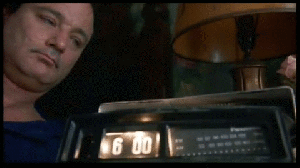So, for books that have been out a while, I decided I would do a post discussing why I loved (or maybe hated, though that would be very rare) a book instead of writing a review. Because, really, I don’t see the logic in writing a “standard” review for a book that’s been out for years. Also, because sometimes, with books, there are only certain things I want to talk about vs. writing a general overview to entice other readers to read the book.
So, here we go with my first attempt at such a thing.
Life After Life follows Ursula Todd as she…you guessed it…lives life after life. But not other lives—her life. The tagline for the book is, “What if you could live again and again, until you got it right?” Well, I’m not sure who else thought of this after reading that, but I did:
However, Atkinson’s telling of Ursula’s many journeys is a bit more nuanced and, of course, a bit more beautiful than Groundhog Day (as much as I did love the film).
First, I loved Kate Atkinson’s prose style. It flowed in a way that made each page easy to read, though some might argue against my statement because of her frequent use of parentheses. However, for me, it worked. I think this is largely due to the fact that I happen to love (sometimes over-) using parenthetical statements in my own writing. Maybe it’s how my brain works. I don’t know. At any rate, her style works for me, which means I’m looking forward to her upcoming novel, A God in Ruins. When compared to Life After Life, Liberty Hardy had to say this:
https://twitter.com/MissLiberty/status/584740700861800448
Along with the voice, I enjoyed the continual literary references. The narrator name drops Brontë, Ibsen, and many others. Of course, it doesn’t hurt that Sylvie, Ursula’s mother, pronounces that “random yet far-ranging knowledge” is “‘the sign that one has acquired one’s learning from novels, rather than an education.'” I feel officially vindicated for the fact that I make some of the oddest associations—book-related or otherwise—of anyone I know. Usually, I err on the side of not voicing them because I don’t think anyone would understand them. So there’s that.
The following exchange occurs on the same page:
“Do you, by the way, know who it was who said, A large income is the best recipe for happiness I ever heard of?
“Austen,” Sylvie said promptly. Mansfield Park. She puts the words in Mary Crawford’s mouth, for whom she professes disdain, of course, but really I expect dear Aunt Jane rather believed those words.”
And so, naturally, I was even more deeply in love with Atkinson, the book, and Sylvie Todd.
I also appreciated the subtle yet acute way Atkinson had of discussing sexual assault, both when experienced at the hand of relative strangers, and in a marriage. I will not describe specific events (so I do not cause undue stress to any of my readers); rather, I will describe the characters’ reactions to them. When Ursula, 16—whom the narrator nearly suggests is so naïve she’s not even sure what is happening—is accosted on her own staircase, Ursula’s response to losing her innocence is poignant: “The arch that led to womanhood did not seem so triumphal anymore, merely brutal and completely uncaring.” It was harrowing to read that, as it was to read about Ursula choosing not to discuss the incident with anyone:
Ursula found it easier than she had expected to lock this occurrence away. After all, hadn’t Sylvie herself said that the definition of an indiscretion was that you didn’t speak of it afterward? Ursula imagined a cupboard in her mind, a corner one, in simple pitch pine. Howie and the back stairs were put on a high shelf and the key was firmly turned in the lock.
I think, really, there’s not a whole lot more to say, other than that Atkinson did well in her representation of sexual assault and domestic violence (a reference to which I purposefully did not include here because the scenes are rather graphic).
To end on a lighter note, I ask you how, truly, I could not love a book that has a history teacher that is “particularly fond of quoting Elizabeth I”? Do not tell secrets to those whose faith and silence you have not already tested. I should say so.
The inclusion, later in the novel, of the (partial) line from Act V of Macbeth, “Life’s but a walking shadow, a poor player that struts and frets his hour upon the stage” is in essence antithetical to the novel’s overall conceit, yet the contrast served as a reminder for me that we do all wish that we could try many, many things over again to get them right. Would I do certain things over again? Absolutely. But would I want to have many attempts at the same life? Or would I want to live my whole life over again until I got it just right? I suppose that was one of Atkinson’s intentions (along with thoroughly engaging the reader, of course). I imagine she wanted to provoke readers to think about the possibility of trying things over again. Maybe not a “life,” necessarily, but a thing. Something we might wish we’d given a second chance. Giving up may not be the best way. After all, as the complete line from Macbeth reminds us,
Life’s but a walking shadow, a poor player
That struts and frets his hour upon the stage
And then is heard no more.
Macbeth V.v.24-26


Pingback: My Year in Books—The Measure of 2015 | Wandering Bark Books